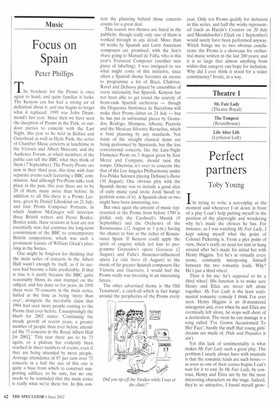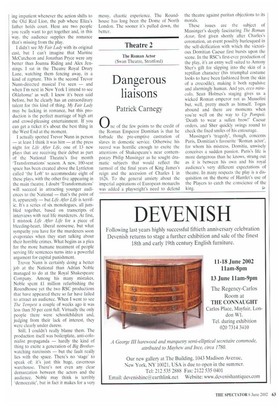Theatre 1
My Fair Lady (Theatre Royal) The Tempest (Roundhouse) Life After Life (Lyttleton Loft)
Perfect partners
Toby Young
I'm trying to write a screenplay at the moment and whenever I sit down in front of a play I can't help putting myself in the position of the playwright and wondering why he's made the choices he has. For instance, as I was watching My Fair Lady, I kept asking myself what the point of Colonel Pickering is. From a plot point of view, there's really no need for him to hang around after he's made his initial bet with Henry Higgins. Yet he's in virtually every scene, constantly interposing himself between the two romantic leads. Why? He's just a third wheel.
Then it hit me: he's supposed to be a third wheel. His function is to make sure Henry and Eliza are never left alone together. My Fair Lady is the least sentimental romantic comedy I think I've ever seen. Henry Higgins is an ill-mannered misogynist and, even when he and Eliza are eventually left alone, he stops well short of a declaration. The most he can manage is a song called 'I've Grown Accustomed To Her Face', hardly the stuff that young girls' dreams are made of. Pride and Prejudice it ain't.
Yet this lack of sentimentality is what makes My Fair Lady such a great play. The problem I nearly always have with musicals is that the romantic leads are such bores — as soon as one of their scenes begins I can't wait for it to end. In My Fair Lady, by contrast, Henry and Eliza are by far the most interesting characters on the stage. Indeed, they're so attractive, I found myself grow ing impatient whenever the action shifts to the Old Red Lion, the pub where Eliza's father holds court. Here are two people you really want to get together and, in this way, the audience supplies the romance that's missing from the play.
I didn't see My Fair Lady with its original cast, but I can't imagine that Martine McCutcheon and Jonathan Pryce were any better than Joanna Riding and Alex Jennings. I sat in the Theatre Royal Drury Lane, watching them fencing away, in a kind of rapture. This is the second Trevor Nunn-directed musical I've seen — and when I'm next in New York I intend to see Oklahoma! as well. I know it's been said before, but he clearly has an extraordinary talent for this kind of thing. My Fair Lady may be lacking in romance, but this production is the perfect marriage of high art and crowd-pleasing entertainment. If you can get a ticket it's about the best thing in the West End at the moment.
I actually spotted Trevor Nunn in person — at least I think it was him — at the press night for Life After Life, one of 13 new plays that are receiving their debut as part of the National Theatre's five month 'Transformations' season. A new. 100-seat space has been created above the Lyttleton called the Loft' to accommodate eight of these plays, with the other five appearing in the main theatre. I doubt 'Transformations' will succeed in attracting younger audiences to the National — that's the point of it, apparently — but Life After Life is terrific. It's a series of six monologues, all jumbled together, based on transcripts of interviews with real life murderers. At first, I mistook Life After Life for a piece of bleeding-heart, liberal nonsense, but what sympathy you have for the murderers soon evaporates when they start talking about their horrible crimes. What begins as a plea for the more humane treatment of people serving life sentences turns into a powerful argument for capital punishment.
Trevor Nunn is certainly doing a better job at the National than Adrian Noble managed to do at the Royal Shakespeare Company. Among his many mistakes. Noble spent £1 million refurbishing the Roundhouse yet the two RSC productions that have appeared there so far have failed to attract an audience. When I went to see The Tempest a couple of weeks ago it was less than 50 per cent full. Virtually the only people there were schoolchildren and, judging from their lack of interest, they were clearly under duress.
Still. I couldn't really blame them. The production itself was boilerplate, anti-colonialist propaganda — hardly the kind of thing to excite a generation of Big Brother
watching narcissists but the fault really lies with the space. There's no 'stage' to speak of: it's just this huge, cavernous warehouse. There's not even any clear demarcation between the actors and the audience. Noble may think is terribly 'democratic', but in fact it makes for a very messy, chaotic experience. The Roundhouse has long been the Dome of North London. The sooner it's pulled down, the better.























































































 Previous page
Previous page